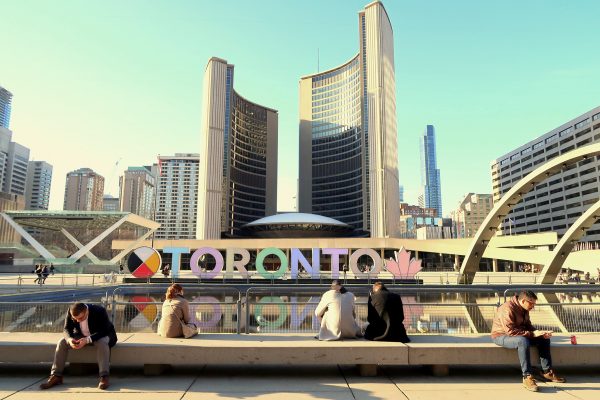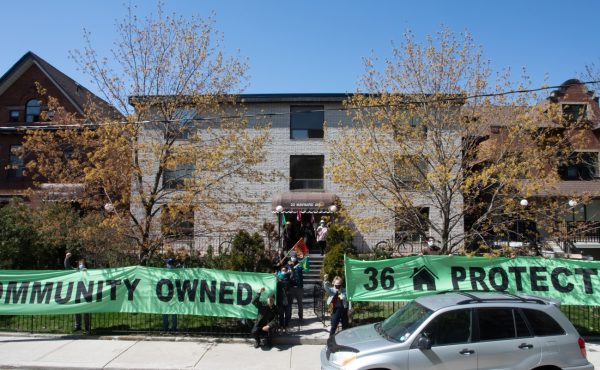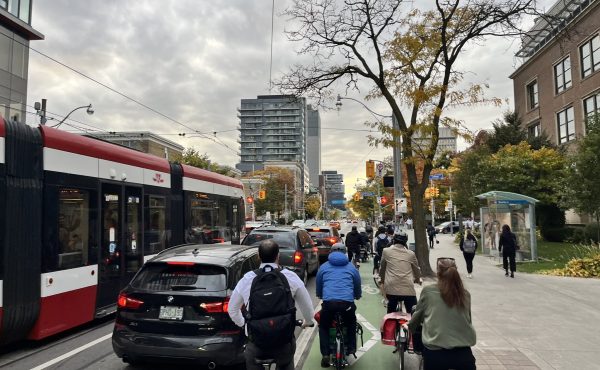For some time, I’ve harboured a growing impatience with the occasional campaigns urging greater institutionalized independence for the City of Toronto, the latest of which — Charter City Toronto — surfaced last week and insinuated itself on city council’s radar. I fear my crankiness on this file may force me to relinquish my Toronto urbanism membership card. But I remain of the view that these asks serve to distract the public’s attention from much larger, and more intractable, problems.
The proponents, of course, would argue that a charter or some other type of formalized self-determination mechanism would allow Toronto’s residents and political leaders to do a better job of tackling the big issues — from climate change to financial sustainability — while fending off abuses of power, such as the Ford government’s assault on the 2018 municipal election.
They do have some specific evidence on their side: the City of Vancouver, for example, has used its charter status to exempt itself from the British Columbia building code and instead assert a more ambitious version that has, in the past two years, triggered a mini-boom in net zero and passive house development.
To its credit, the Charter City Toronto group, led by former mayor John Sewell, has sought to address the jurisdictional black hole at the core of the charter movement, which is, essentially, that what the province giveth, the province can also taketh away. If municipal independence is contingent on a provincial law conferring charter status, as is the case with Edmonton and Calgary, that guarantee of self-determination can only ever be as robust as the political will in the legislature.
To counter this paradox, the Charter City group has argued for an amendment under Section 43 of the Constitution Acts, and cites examples wherein individual provinces and the federal government cut bilateral deals to amend the country’s highest law. Finally, in a nod to the reality that Toronto’s urban exceptionalism is a myth, the Charter City proponents seem to be arguing not just for the City of Toronto, but rather a deal that encompasses all GTHA municipalities, or at least one that gives them the ammunition to negotiate their own freedom.
“No rules are fireproof,” the group states, “but the ones we propose would afford solid protection for the city.”
What’s not to love?
Against this seemingly persuasive brief, my question has to do with political culture, and the role it plays, or not, in the way a city asserts its right to govern.
I gladly concede that there’s a chicken-and-egg dilemma at play here. The Charter City advocates will say that the oft-cited arrested adolescence of Toronto’s political culture follows directly from the reality that the other orders refuse to treat us like a grown-up level of government.
I’m not persuaded, however, and we can look to the 13-year history of the City of Toronto Act for evidence that expanded powers didn’t produce more robust and purposeful decision-making. With the abuses of the Doug Ford era dominating our mental radars, it’s easy to forget that CoTA was on the books through the tenures of three mayors and two premiers before the current crowd at Queen’s Park decided to drive a truck through — or perhaps more accurately, over — the legislation.
Yes, CoTA was an act of the provincial legislature. But in the pre-Doug era, when council had a mostly cooperative dance partner in the Pink Palace, did CoTA yield dramatic changes? Its best-known application is, of course, the Municipal Land Transfer Tax, which has produced an ambiguous legacy – on the one hand, keeping the City out of the red as the annual LTT revenues piled up, but also deepening our addiction to the dubious windfall of rampant residential real estate speculation.
Despite a monumental amount of evidence about the structural instability in the City’s finances, council has never availed itself of any of the other taxing powers in CoTA, which are not trivial. And while mayor after mayor has balked at anything beyond the most marginal property tax hike come budget time, we continue to pour money into unsustainable capital schemes – e.g., the Gardiner East rehab — while letting manifestly necessary ones such as waterfront transit, to name but one, languish.
Same story with housing: year after year, term after term, Toronto council has tolerated a land use regulatory regime that demonstrably delivers vast benefits to the affluent while depriving everyone else of affordable housing. Just consider that the City of Mississauga’s definition of affordable housing is way more progressive than Toronto’s is (Mississauga’s benchmark is based on average incomes whereas Toronto uses an average market value test). Why?
The point is that for many years, Toronto enjoyed a mostly uncontested latitude to act in certain domains, but didn’t. We believe Vision Zero means more public awareness campaigns instead of infrastructure. We refuse to grow our tax base even as the 905 municipalities do just that. We subsidize wealthy and outspoken homeowners and throw scraps at everyone else. We waste staggering sums of money on capital projects that should have been deep-sixed years ago.
To me, the core problem is that Toronto’s political culture is built on a self-perpetuating foundation of complaint, incrementalism and compromised fiscal judgment. Perhaps more entrenched powers would change that stubborn equation, but I’m not convinced. What’s more, I certainly don’t rule out the possibility of another hard-right mayor, in the mode of the late Rob Ford, gaining power. Do we want such a person in charge, for example, of K-12 education, as the Charter City Toronto group proposes? I certainly hope not.
How we repair or at least reorient the city’s political culture is not unrelated to the debate about autonomy, but it’s not the same conversation. That question is about fostering a climate of resilient, inclusive and forward-looking governance, leadership and vision – all qualities that can deliver lasting change, but don’t, in my view, necessarily flow from the structural fixes proposed by the charter advocates.
Put another way, I can go out and spend $800 on a pair of top-of-the-line skates and a custom graphite hockey stick. But will that make me a better player, or merely a mediocre player with excellent gear?






One comment
John, you pose a great question: could a City Charter help to transform the political culture of Toronto, which is often timid, incremental and backward?
Charter City Toronto’s answer is yes, maybe.
Contrary to your perception, we see evidence that giving the city more authority can and does prompt our city leaders to rise to the occasion—often, only to find themselves undercut by provincial override, which is the very thing our Charter proposal seeks to halt.
You cite the city’s failure to enact many of the taxes allowed under the 2006 City of Toronto Act as evidence that the city won’t use powers a Charter might give it.
In fact, city council implemented the first of its new COTA tax powers quickly: the land transfer tax. Not a great tax for the reasons you cite, but it was a use of the new tax powers, at some political cost, and the tax has raised significant amounts of badly-needed money. (COTA doesn’t exactly provide a mouth-watering menu of effective taxation possibilities to begin with.)
Council used another COTA power to create the controversial vehicle registration tax, which took some guts and raised some $55 million a year before Rob Ford ripped it up within seconds of taking office. Granted, this was not a provincial override and the city has not since reinstated this tax. One step forward, one step back.
Post-Ford, city council again demonstrated resolve in the taxation department. The new COTA offered the city the power—not to implement road tolls on its own—but to ask the province for the power to do so. In a pretty bold move in this car-crazy city, council decided to toll the Gardiner and the DVP. Up went the mayor to Queen’s Park in short pants, only to be cut off at his naked knees. ‘You may not toll the roads you own’, said the province. ‘Instead, take this part of the provincial gas tax so we can make you even more dependent on provincial money and more vulnerable to future governments who may decide to revoke or reduce this contribution.’
So I think it’s fair to say the city did step up somewhat on taxes and if we’d had a protected City Charter with road toll powers in 2017, we’d be paying down the TTC’s infrastructure deficit as we speak.
City Hall also stepped up to get slapped down when it came to fixing the abysmal land use regime you rightly detest. The biggest problem here was the star chamber Ontario Municipal Board of provincial appointees substituting their wisdom for that of elected and appointed city officials. The city railed against it for decades, finally mustering, with other cities, sufficient political sway to get the province to ditch it. Then what happened?
Barely had the welts on the city’s wrists begun to heal before the next provincial government reapplied the shackles and ratcheted them tight. It threw out city land use plans years in the making, hamstrung the city’s ability to negotiate with developers for community benefits and reinstated the old OMB rules on land use appeals that render the city’s own decision-making process damp and useless.
And: when the city in 2018 made a fully-considered and eminently robust city decision—entirely within city discretion–to improve voter representation by adding three new wards, what happened then?
Ford Province unilaterally slashed council from the intended 47 members to a neutered 25. In the middle of the election.
It’s hard to overstate the impact of that decision on the city. A 47-ward council would be more female, more diverse, younger, and comprising a far smaller ratio of the stale old incumbents responsible for the political culture we have today. It would be more representative of the city and almost certainly a lot bolder and readier to robustly make the purposeful decisions you’re pining for, John.
If we’d had a constitutionally protected City Charter last year it would have ensured that once-in-a-generation change in political culture.
This repeated provincial veto of bold (and not-so-bold) city decisions can’t help but contribute to a timid political culture. Why should the city spend the energy to dream up solutions it knows the province won’t allow?
Maybe the real question is not whether a City Charter will transform the political culture at city council, but which of the two available, broader political cultures do Torontonians prefer? And which is more likely to foster civic resoluteness?
The one with two levels of government constantly in friction, where the more powerful one dictates outcomes, duplicates, second-guesses and undercuts decisions, gorges itself on the city’s tax wealth, imposes decisions that benefit provincial political parties instead of city residents and sometimes goes out of its way to actually do the city harm?
Or the Charter City one where there is a single set of decision-makers on city affairs, with exclusive authority and dedicated resources, who can act in the knowledge that whatever they decide will be judged by city voters and not by provincial politicians from a few towns over?
To use your analogy, fancy equipment may or may not make you a better hockey player, but how does your team win when the other side gets to set the rules, call the penalties and randomly change the score? Why even get on the ice?